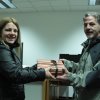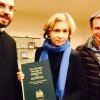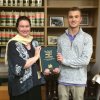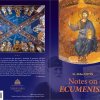The book on Serbia’s Christian Heritage in Kosovo and Metohija, its heartland in medieval times and through Ottoman domination, in recent months introduced to a wide reading public the oldest and richest treasury of Serbian medieval history and culture. Many university libraries were very pleased to have a copy of this high-quality publication, outlining the spiritual and artistic heritage of the Serbian Orthodox Church. It has been added to reference collections and now many students and faculty will make use of the ready access to it.
Joana Knezevic (California Institute of the Arts) presented the book The Christian Heritage of Kosovo and Metohija to the California Institute of the Arts Library. The gift was received by Bret Purpus, Associate Librarian. The monograph has been added to the library collection and is available for use by students and faculty.
Valérie Pécresse, a candidate for president of the Paris region, on December 6 attended the service in the Serbian Orthodox Church of Saint Sava in Paris, where she received a book The Christian Heritage of Kosovo and Metohija. She said: "We have to find a way to protect the very Serbian Orthodox heritage. We have an obligation to help the affected communities. It should be a universal role of France in the world."
Marko Macura (San Jose State University) donated the book The Christian Heritage of Kosovo and Metohija to the San Jose Dr. Martin Luther King Jr. Library. The gift was received by Rebecca Kohn, Associate Librarian (special collections).
Through these efforts, The Christian Heritage of Kosovo and Metohija established itself as the definitive record of the history of Kosovo and Metohija and is appreciated by many scholars.








